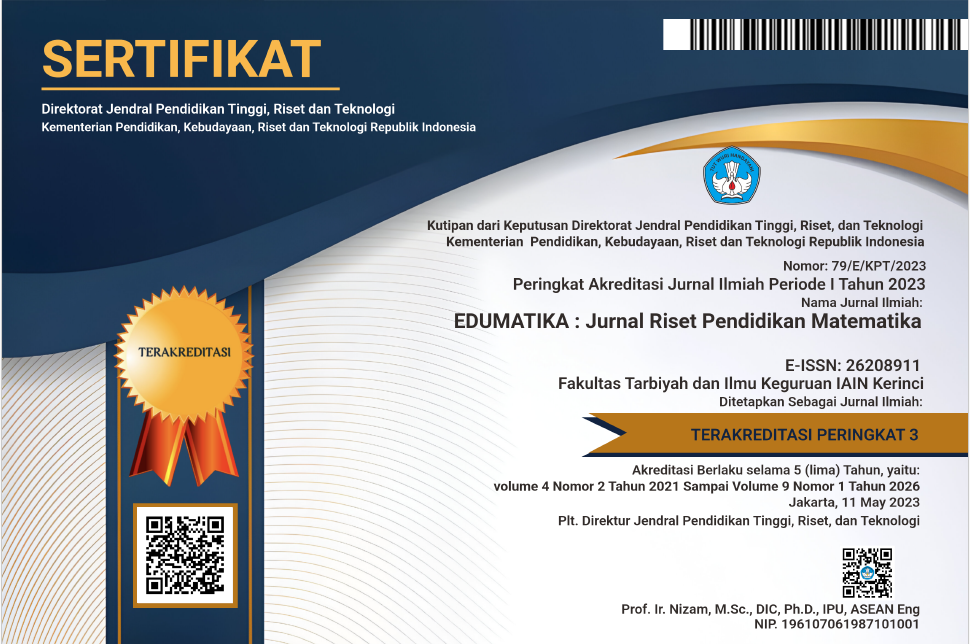
Focus and Scope
Edumatika : Jurnal Riset Pendidikan Matematika
e-ISSN: 2620-8911 p-ISSN: 2620-8903
The aim of the Edumatika : Jurnal Riset Pendidikan Matematika (EJRPM) (in English: Journal of Research in Mathematics Education) is to provide both a national and international platform for the exchange, dissemination, and discussion of research, experiences, and perspectives in mathematics education. The journal focuses on a broad range of topics related to the development and improvement of teaching and learning practices in mathematics.
The journal invites original research articles that have not been submitted to other journals or conferences. Contributions are welcome from the entire spectrum of mathematics education research, including, but not limited to, the following areas:
Cultural Integration in Mathematics Education
This field studies the relationship between mathematics and culture, exploring how mathematical practices are embedded in various cultural contexts. Research in ethnomathematics often seeks to integrate cultural perspectives into the teaching of mathematics, promoting diversity and inclusivity in education.
Recommended references: Ubiratan D’Ambrosio (founder of ethnomathematics) and Paulus Gerdes, who have conducted pioneering research in this field. Also Marcia Ascher.
Technology Utilization in Mathematics Education
This area explores the integration of Information and Communication Technology (ICT) in mathematics education, focusing on how digital tools, software, and platforms can enhance learning experiences, facilitate understanding, and promote engagement with mathematical concepts.
Recommended references: Celia Hoyles and Richard Noss, both of whom have extensively studied the role of ICT in mathematics learning and teaching.
Realistic Contexts in Mathematics Education
This approach emphasizes the use of real-world contexts and situations to make mathematical concepts more meaningful and relevant to students. RME seeks to bridge the gap between abstract mathematics and practical applications, fostering deeper understanding.
Recommended references: Hans Freudenthal (founder of RME), Paul Cobb, and Marja van den Heuvel-Panhuizen who have contributed significantly to the development of this approach.
Thinking and Skills in Mathematics Education
Research under this theme investigates the development of students' higher-order thinking skills, such as analysis, evaluation, and synthesis, through mathematics education. It emphasizes instructional strategies that go beyond basic memorization and understanding to foster critical and creative thinking.
Recommended references: Benjamin Bloom (creator of Bloom’s Taxonomy) and Lauren Resnick, who have both contributed to the understanding and development of higher-order thinking in education.
Inclusive Practises in Mathematics Education
Islamic Values in Mathematics Education
Literature Review in Mathematics Education
Through these focus areas, Edumatika aims to contribute to the academic discourse and practice of mathematics education, fostering innovation and improvement in the field.









